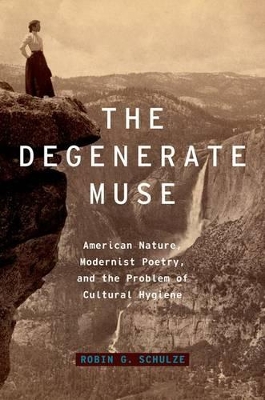Modernist Literature and Culture
1 total work
This book offers an important reconsideration of the cultural impulses that drove American literary modernism. America's modernist poets came of age in a nation struggling to redefine its relationship with poetry and with nature. In the early twentieth century, Darwinian science dictated that as countries became more civilized, as their citizens dwelt increasingly in the realms of artifice they created, they ceased to engage in the invigorating struggles against
nature that kept them fit. Civilization led to the medical condition known as degeneration, the morbid deviation of men from an identifiable "normal type." Eager to save America from the fate of a degenerate Europe, Progressive Era reformers prescribed the invigorating contact with American nature as a
means to keep the American race clean and healthy. In order for nature to serve as an antidote for degeneration, however, it needed to remain a realm of hard facts and unremitting forces, a delusion-free place free of art that cleansed the mind rather than clouded it. Drawing on a wide range of primary and archival sources, this book argues that the widespread American turn back to nature in the early twentieth century had profound consequences for America's modernist poets. Like other
Americans of their day, Harriet Monroe, Ezra Pound, and Marianne Moore heeded the widespread American call to head back to nature for the sake of the nation's health, but they faced a difficult challenge. Turning to American nature as a means to combat the threat of American degeneration in their literary
work, they needed to create a form of American poetry that would be a cure for degeneration rather than a cause. My work reveals the ways in which Monroe's, Pound's, and Moore's struggles to create and publish poems that could resist degeneration by keeping faith with American nature influenced ideas about what American poetry should be and do in the twentieth century.
nature that kept them fit. Civilization led to the medical condition known as degeneration, the morbid deviation of men from an identifiable "normal type." Eager to save America from the fate of a degenerate Europe, Progressive Era reformers prescribed the invigorating contact with American nature as a
means to keep the American race clean and healthy. In order for nature to serve as an antidote for degeneration, however, it needed to remain a realm of hard facts and unremitting forces, a delusion-free place free of art that cleansed the mind rather than clouded it. Drawing on a wide range of primary and archival sources, this book argues that the widespread American turn back to nature in the early twentieth century had profound consequences for America's modernist poets. Like other
Americans of their day, Harriet Monroe, Ezra Pound, and Marianne Moore heeded the widespread American call to head back to nature for the sake of the nation's health, but they faced a difficult challenge. Turning to American nature as a means to combat the threat of American degeneration in their literary
work, they needed to create a form of American poetry that would be a cure for degeneration rather than a cause. My work reveals the ways in which Monroe's, Pound's, and Moore's struggles to create and publish poems that could resist degeneration by keeping faith with American nature influenced ideas about what American poetry should be and do in the twentieth century.
